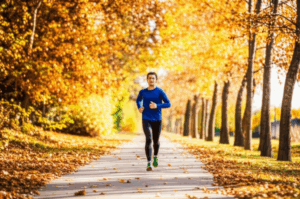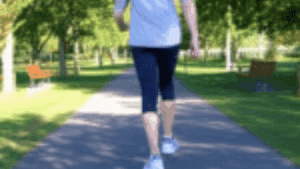For those struggling to achieve restful nights, the solution might be as simple as incorporating exercise into your daily routine. However, the timing of your workout could be the key to unlocking optimal sleep benefits. While the relationship between exercise and sleep is complex, understanding how different times of day affect your body can help you tailor your fitness schedule for better sleep.
The Exercise-Sleep Connection: How it Works
Regular physical activity can lead to improved sleep quality, reduced sleep latency (the time it takes to fall asleep), and better overall sleep. Exercise can also help manage sleep disorders like insomnia.
Here’s how exercise may improve sleep:
- Boosts Melatonin: Physical activity increases the production of melatonin, a hormone that regulates sleep-wake cycles.
- Reduces Stress: Exercise helps reduce stress, a common barrier to falling and staying asleep.
- Improves Mood: Physical activity improves mood, leading to increased enthusiasm for physical exercise and a positive feedback loop.
- Regulates Body Temperature: Exercise increases body temperature, and the subsequent drop 30-90 minutes post-exercise can facilitate sleepiness.
- Resets Circadian Clock: Exercise, especially when performed outdoors, can help synchronize your body’s natural sleep-wake cycle with the environment.
Morning Exercise: A Great Way to Kickstart Your Day and Improve Sleep
Exercising in the morning, particularly between 7 a.m. and 9 a.m., can be a game-changer for your sleep.
Benefits of Morning Workouts:
- Better Sleep Quality: Morning exercise can help regulate your circadian rhythm, potentially leading to better sleep at night. It may also increase the amount of deep sleep you get.
- Resets Circadian Rhythm: Morning workouts can shift your internal clock earlier and improve sleep latency, making it easier to fall asleep earlier. Exposure to natural light during morning exercise reinforces these natural rhythms.
- Boosts Metabolism: Morning exercise can boost your metabolism and increase energy levels throughout the day.
- Promotes Consistency: People tend to be more consistent with morning exercise due to fewer distractions.
Potential Downsides:
- Stiffness: You might experience stiffness in your joints and temporary inflexibility.
- Longer Warm-up: Your core body temperature is lower in the morning, so it may take longer to warm up.
Afternoon and Evening Exercise: Is it Bad for Sleep?
The effects of afternoon and evening exercise on sleep are more nuanced. While it was once believed that evening workouts could disrupt sleep, recent research suggests that moderate-intensity exercise is fine as long as it’s not too close to bedtime.
Benefits of Afternoon/Evening Workouts:
- Improved Physical Performance: Muscle strength, flexibility, power output, and endurance are generally better in the afternoon and evening.
- Stress Relief: Evening exercise can be an effective way to unwind and relieve stress after a long day.
- Increased Deep Sleep: Moderate-intensity activity in the afternoon or evening might increase deep sleep.
Potential Downsides:
- Sleep Disruption: High-intensity exercise close to bedtime can increase energy and keep you awake. It may also elevate heart rate and decrease REM sleep.
- Inconsistency: Some people may be too tired to exercise at night.
Key Considerations for Evening Exercise:
- Intensity: Stick to light to moderate-intensity activities like yoga, stretching, walking, or light jogging. Avoid vigorous workouts like running, HIIT, or heavy weightlifting close to bedtime.
- Timing: Finish your workout at least 1-2 hours before bedtime to allow your body to wind down.
- Listen to Your Body: Pay attention to how your body responds to evening exercise and adjust your routine accordingly.
Exercise Types and Sleep: What Works Best?
The type of exercise you choose can also impact your sleep.
Excellent choices for improving sleep:
- Aerobic Exercise: Moderate-intensity aerobic exercise, such as swimming, biking, jogging, or brisk walking, can improve sleep quality and may be effective for people with insomnia. Aim for at least 30 minutes a day.
- Resistance Training: Resistance exercises like sit-ups, push-ups, and weight lifting can improve sleep and lower anxiety and depression symptoms.
- Yoga: Yoga combines gentle stretches, controlled breathing, and meditation, making it an ideal choice for promoting relaxation and reducing stress.
- Tai Chi and Qigong: These traditional Chinese exercises involve slow, flowing movements and can improve sleep quality and decrease insomnia.
A recent meta-analysis found that Pilates might be the most effective exercise for improving sleep quality, followed by aerobic exercise and combined aerobic and resistance training.
How Much Exercise Do You Need?
Aim for at least 30 minutes of moderate-intensity physical activity daily to improve sleep quality. For long-term sleep health benefits, aim for 150 minutes of moderate-intensity physical activity and 2 days of muscle-strengthening activity every week. Adults who exercised for at least 30 minutes a day slept an average of 15 minutes longer than those who did not.
Tailoring Exercise to Your Chronotype
Your chronotype, or natural sleep-wake preference, can also influence the best time to exercise for sleep.
- Early Birds: Early risers may benefit from high-intensity exercise in the morning or afternoon.
- Night Owls: Night owls may be most comfortable exercising later in the afternoon or early evening, finishing at least 90 minutes before bedtime. Morning workouts might be a game-changer for night owls who want to fall asleep earlier.
Other Tips for Better Sleep
In addition to exercise, consider these tips for improving your sleep:
- Maintain a regular sleep schedule: Go to bed and wake up at the same time each day, even on weekends.
- Create a relaxing bedtime routine: Take a warm bath, read a book, or listen to calming music.
- Optimize your sleep environment: Make sure your bedroom is dark, quiet, and cool.
- Avoid caffeine and alcohol before bed: These substances can interfere with sleep.
- Limit screen time before bed: The blue light emitted from electronic devices can disrupt sleep.
The Bottom Line
While there’s no one-size-fits-all answer, the best time to exercise for better sleep is generally in the morning or at least a few hours before bedtime. Moderate-intensity exercise appears to be more beneficial than high-intensity exercise, especially close to bedtime. The key is to find a routine that works for you and stick with it. Regular exercise, combined with good sleep hygiene practices, can pave the way for restful nights and improved overall health.







